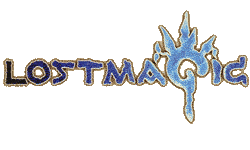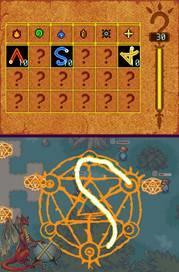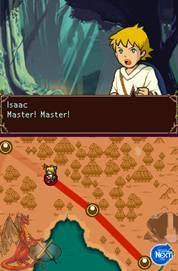|
|

|
BATTLE SYSTEM
|

|
INTERACTION
|

|
ORIGINALITY
|

|
STORY
|

|
MUSIC & SOUND
|

|
VISUALS
|

|
CHALLENGE
|
Hard
|
COMPLETION TIME
|
8 - 15 hours
|
|
OVERALL
3.0/5
|
Rating definitions
|
|
|
Real Time Strategy and RPG generally are not two terms used in tandem. However, if it was going to be done, it needed to be a delicate blend of fast-paced action as well as the usual RPG flavor. Here enters a title for the Nintendo DS, called Lost Magic, one of the first games to combine together these unusual elements, with a fair amount of succees. With a snappy battle system and good music, it almost overcomes the weakness in story and interface, but overall is not a bad game at all, taking good advantage of the touch screen of the DS.
Much like a tactical game, Isaac, the main character, moves from point to point on a map. Spots marked with a large blue arrow will have an event, a battle, or both. Other spots may be random encounters, but thankfully not every location is always an encounter. Once battle begins, the strategy element takes over. Each battle is timed, so decisions must be made quickly; while it is uncommon to run out of time, it is possible. Isaac never attacks with his weapon, relying solely on his magical powers. As the game progresses, he will receive runes (magical spells) from each element: fire, water, earth, wind, light and dark. Runes are cast by holding down the L shoulder button (or the R shoulder button in the case of a left-hand setup), and drawing the correct shape on the screen. A graph showing each rune is displayed on the top screen, so memorization is not necessary. The closer a rune is to its true shape, the stronger and more effective the spell will be. A well-drawn rune will have a small jingling noise when it is cast. Many spells require a direction or a zone, which is chosen with the stylus, and can be dragged around within a certain area. Each spell takes a portion of his MP, which regenerates as the battle moves forward. Moving around lets Isaac recover MP faster. In addition, a method to cast two or three runes at once can be learned later in the game. Dual Runes combined together have the effect of the first rune cast, but the element of the second rune. For example, casting the water rune alone sends an icicle shooting out like a shotgun blast; casting the water rune, then the light rune sends three balls of light energy shooting out like shotgun blasts. This is a very handy way to combat single elemented enemies, especially ranged units. The first dark rune is a special sort of spell: it allows Isaac to capture monsters, and have them fight for him permanantly; once controlled, they enter battle in groups of 2 or 3. Each monster captured is displayed at the end of the battle and can be used from that point forward, providing Isaac has enough Line Up Points (LP); he can control a maximum of three different groups of monsters at once. Monsters take anywhere from 2-6 LP each, and at Isaac's max level of 50 he will have 11 LP. Thus, careful thought must be put into which monsters should be used for each playstyle.
 Drawing a Rune
Drawing a Rune
|
|
If for whatever reason the battle is lost (Isaac is defeated, the conditions are not met, or time runs out) then a chance to return to directly before the battle is open to the player. Otherwise, they may choose to return to the main menu. The AI in Lost Magic is actually rather intelligent: not only will it target Isaac whenever he leaves himself open to attack, ranged enemies run away when melee units get close, and like to run away to spots where melee units cannot reach them. This is aided by judicious stage structure. The rest of the battle system, however, does have several flaws. First and foremost, the difficulty difference between regular fights and boss battles is staggering. Every boss requires a slightly different strategy, as well as carefully selected monsters. While Isaac can retain more than enough monsters to have multiple sets, capturing them takes time and practice, and may frustrate some players considering how fast-paced the rest of the game is. All this combined together does have the unfortunate side effect of making the game somewhat tedious, especially later in the game when bosses not only use large amounts of triple runes, but also have a habit of putting themselves in small corners with impenetrable walls in front of them.
As mentioned, the difficulty of the game will vary upon two things. Whether the battle Isaac faces is against a boss or not, and the choice of monsters he makes. Often, the best strategy for completing either type of level is to have a trio of monsters with the same element as the surroundings. When fighting the fire boss it behooves the player to bring fire-based enemies. This is both because these levels are filled with lava (deadly to non-fire creatures, it heals fire monsters both ally and enemy), and because the boss will cast strong fire spells, which will either do no damage or heal Isaac's monsters. To amp up the difficulty, some levels have monster spawn gates, which spit out monsters up to the original number which existed in the stage. For example, if there are four of the same type of monster, that gate will spit out monsters until there are four on the battlefield again. There is no way to close the gates, but leaving an ally standing on the gate will prevent any more monsters from spawning from it. While the game could be completed in a rush and take as little as 8 hours, more cautious players who experiment with strategies will find their clock ticking upwards of 15 hours, especially if backtracking is necessary.
The music helps set the mood in the game, both during battle and the storyline sequences. With a variety of tunes, the background music never dulls and is a rare enjoyable part of the game. The visuals, done in a heavily-shaded anime style, are easy on the eyes and suit the DS, as well as the mood of the game, perfectly. If nothing else, both these areas of the game are sweet delights for the senses, which is surprising considering that some of the other aspects of the game leave much to be desired.
A good example of this is the story, which is terribly weak. Not only is it an overused story, there's very little about it that really adds to the game. The sole redeeming part of the storyline is that it allows multiple endings based off of the rare conversation choices Isaac makes, both with his companion Trista as well as other people in the game. Thankfully, there's plenty of other places in the game where originality abounds. There is a good variety of monsters and abilities, many well-crafted battle locations, and well done visuals and music, so not all is lost.
 Isaac Calling Out
Isaac Calling Out
|
|
With Ubisoft's past history with an RPG on the DS, there was some concern as to how well done the localization of Lost Magic would be. While the job was not particularly stunning, it did well enough. It's hard to really blame a lukewarm localization for dragging down a story that already began as poor. The menu systems are well laid-out and very functional. The main menu allows the player to switch monsters, check Isaac's spellbook for the spells he has discovered or seen, save, and load. When selecting monsters with the touch screen, their stats are displayed on the top screen, so it is easy to compare monsters. This is also where monsters can be equipped with special items found on the battlefield; while items do not gain experience, higher level versions are more effective. A Life Bracelet of Level 1 gives less HP than one that is level 3. If functionality was what the game creators were shooting for, they succeeded gracefully.
While a great idea on paper, something was missed in the transition between idea and full-fledged game. Somehow, it simply seems that the further into Lost Magic a player goes, the less fun and enjoyment can be gained from the game. While bringing down a difficult enemy is always rewarding, too often several battles are strung together. This includes many tough boss fights with no reprieve in between, resulting in a tedious, rather than enjoyable, experience. Those who have plenty of patience and an enjoyment for plotting out minute strategem should definitely give this title a second look. Those who don't enjoy capturing and levelling up monsters, or have little patience, should steer clear.
Review Archives
|









